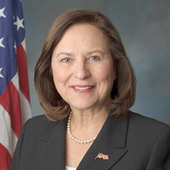Bolstering broadband
Geographic hurdles and population density challenges have left many Nebraskans in rural areas without broadband service. Urban residents, too, face problems with aging and outdated telecommunications infrastructure. Insufficient Internet access and dropped phone calls are more than mere inconveniences. They are a threat to public safety, they hinder economic development, and they isolate entrepreneurs working hard to connect with customers and suppliers across the nation.
I believe that promoting a 21st century infrastructure is a core duty of the federal government, which is why I have been working with my colleagues across the aisle to address ongoing communications challenges impacting Nebraskans.
During my time in the U.S. Senate, I've led a number of policy initiatives to increase access to high-speed telephone and Internet services for all Americans. I've worked with Senator Tim Johnson (D-S.D.) and Senator Amy Klobuchar (D-Minn.) on a bipartisan resolution urging the Federal Communications Commission (FCC) to resolve call completion problems and crack down on carriers that discriminate against rural customers.
In October, I was pleased the FCC announced that it was adopting new rules to improve the agency's ability to investigate call completion problems. It plans to take immediate steps to improve the performance of long distance calls.
I've also worked with Senator Al Franken (D-Minn.) on an amendment to the Senate's budget. This bipartisan proposal specifically identified broadband infrastructure as a priority for the federal government as it considers deficit-neutral investments for the coming fiscal year. The Senate unanimously adopted our amendment in March.
Despite this progress, another significant hurdle remains for Americans in need of broadband access: taxation.
Chief Justice John Marshall once famously wrote that the "power to tax is the power to destroy." In recent years, increased taxes on Internet access have destroyed robust broadband development. For example, while broadband is available throughout 95 percent of the United States, only 65 percent of the country is able to actually "plug in." Part of the reason for this gap in access is rising costs due to new taxes.
As most Americans have learned the hard way, many of these taxes come at the state and local level. As a member of the Nebraska Legislature, I introduced legislation (L.B. 165) to place a limit on the telecommunications occupation tax unless the voters approved such an increase. I was pleased the Legislature passed my bill in 2011.
Now, as a member of the United States Senate, I am proud to cosponsor legislation to prohibit new taxes on Internet access. The Internet Tax Freedom Forever Act, S. 1431, also bans multiple or discriminatory taxes on electronic commerce. Similar legislation was originally enacted in 1998. While it has been subsequently extended several times, the Internet Tax Freedom Forever Act would make the tax prohibitions permanent.
Expanding access to broadband requires both modern infrastructure and affordable costs for consumers. Reliable phone and Internet access are not luxuries. They are necessities for businesses to remain competitive; they help to provide healthcare to rural or remote areas; and they ensure the public safety of our citizens. That is why I'm committed to supporting smart policies to bolster broadband access -- it's a safety issue and it's a jobs issue.
I will also continue to support legislation like the Internet Tax Freedom Forever Act to push back against taxation on Internet access. Rather than hindering Nebraskans with financial burdens, we should be doing what we can to enhance their access.
Thank you for taking part in our democratic process. I look forward to visiting with you again next week.

